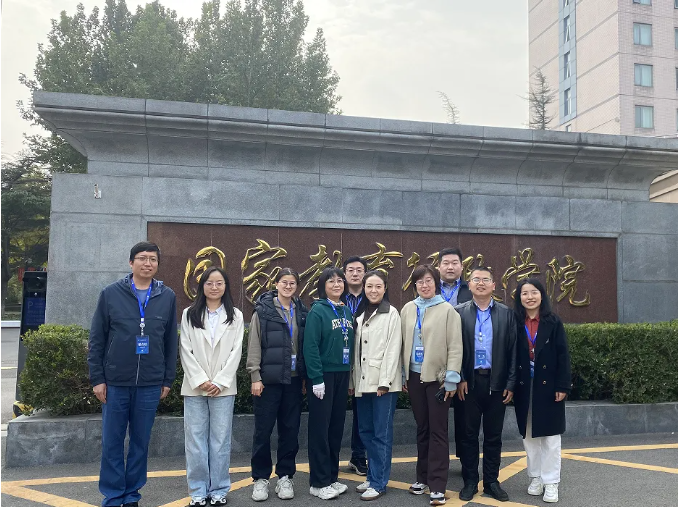 To thoroughly study and implement Xi Jinping Thought on Socialism with Chinese Characteristics for a New Era, fully carry out the guiding principles of the Third Plenary Session of the 20th Central Committee of the Communist Party of China (CPC) and the National Conference on Education, and continuously consolidate and expand the achievements of Party discipline education campaign, from 22 October to 20 November 2024, the Open University of China (OUC) hosted a special training programme for young cadres on studying and implementing the guiding principles of the Third Plenary Session of the 20th CPC Central Committee.
To thoroughly study and implement Xi Jinping Thought on Socialism with Chinese Characteristics for a New Era, fully carry out the guiding principles of the Third Plenary Session of the 20th Central Committee of the Communist Party of China (CPC) and the National Conference on Education, and continuously consolidate and expand the achievements of Party discipline education campaign, from 22 October to 20 November 2024, the Open University of China (OUC) hosted a special training programme for young cadres on studying and implementing the guiding principles of the Third Plenary Session of the 20th CPC Central Committee.
Thirty-nine young cadres from 28 departments of the university attended training at the National Academy of Education Administration in four separate batches.

Uniting in Our Original Aspiration and Mission to Enhance Theoretical Strengths. This training programme centred on studying and implementing Xi Jinping Thought on Socialism with Chinese Characteristics for a New Era, with a focus on the guiding principles of the Third Plenary Session of the 20th CPC Central Committee and the National Conference on Education, General Secretary Xi Jinping’s important thoughts on Party building, and Xi Jinping Thought on Diplomacy. It included special tutorial sessions aimed at strengthening participants’ awareness of bigger picture, expanding their strategic thinking, and turning the vision of becoming a leading country in education into concrete actions for high-quality educational development.
Gathering collective efforts in reform to foster new capabilities for responsibility fulfilment. During the training, several experts and scholars focused on key issues such as enhancing leadership skills of officials in education sector and reforming university governance. They delivered thematic lectures on topics including "Deepening the Rule of Law in School Governance", "Reforming the Management System for Personnel in Universities", "Standards for Good Officials in the New Era", and "Growth of Young and Middle-Aged Officials". Experts, starting from the new situation, phase, and requirements of the education system, led the participants to base their exploration on the cause of education and their job roles, seeking new paths towards modernising the governance system and capabilities in higher education institutions.
Leveraging digital potential to create new vitality for educational development. General Secretary Xi Jinping has emphasised, "Digital education is where our country can achieve breakthroughs in opening up new areas and forming fresh strength of educational development. " This training programme closely followed the digitalisation strategy and encompassed lectures on four key topics: the digital transformation of higher education, nurturing top-tier innovative talent, constructing an innovative university faculty, and fostering collaboration between industry, academia, and research. Participants were inspired to embrace the roles of pioneers and explorers, leveraging the new engine of digital education to its full potential and dedicating their youthful vigour to the new quest of building a leading country in education.
Pooling collective wisdom to broaden new avenues for learning and exchange. During the training, participants conducted on-site visits to universities in Beijing, such as Renmin University of China and China University of Geosciences, and the SeeWo Future Education Industrial Park. Activities included face-to-face policy discussions, round-table meetings with university secretaries and deans, and visits to micro application achievements show of "AI + Education". Parallel exchanges were also organised between participants and experts in the education field, creating an exchange space and learning platform for mutual learning, shared insights, and collaborative progress.
Fostering consensus on aesthetic education to cultivate a fresh climate for cultural inheritance. The training programme organised visits to the Museum of the War of Chinese People’s Resistance Against Japanese Aggression and the Cultural Palace of Nationalities to forge a strong sense of community for the Chinese nation, and to harness the power of carrying forward the revolutionary traditions. A special report was given on "Integrating the Five Domains of Education to Cultivate People Through Culture" (The five domains of education refer to sound moral grounding, intellectual ability, physical vigour, aesthetic sensibility, and work skills), a micro tribune was held on "Shifting of Values in Folk Arts and Crafts", and intangible cultural heritages, such as Baduanjin exercises and pottery making, were experienced. The participants were led through immersive experiences to appreciate the essence and allure of traditional culture, thereby further strengthening their sense of national cultural identity and self-confidence.
This training programme closely followed the 'bring questions in - learn around questions - apply solutions back home' training loop. It employed various methods to continuously enhance the effectiveness of the training and optimise service delivery, including pre-departure meetings, arranged visits for exchange, production of training videos by groups, and the writing of reflective essays by participants. The trainees unanimously expressed their firm intention to internalise responsibility, embody it in their actions, and implement it in their work. They are determined to address the two significant questions of our time : "A Leading Country in Education, the OUC’s Role" and "Building a Learning Society, the OUC’s Role". Committed to preserving traditions and embracing innovation, they aim to contribute their youthful vigour to the construction of a world-class open university with distinctive Chinese characteristics, to unite efforts in developing the Seniors University of China, and to seize opportunities to build a digital university connecting the world.
Contributed by Organisation Department